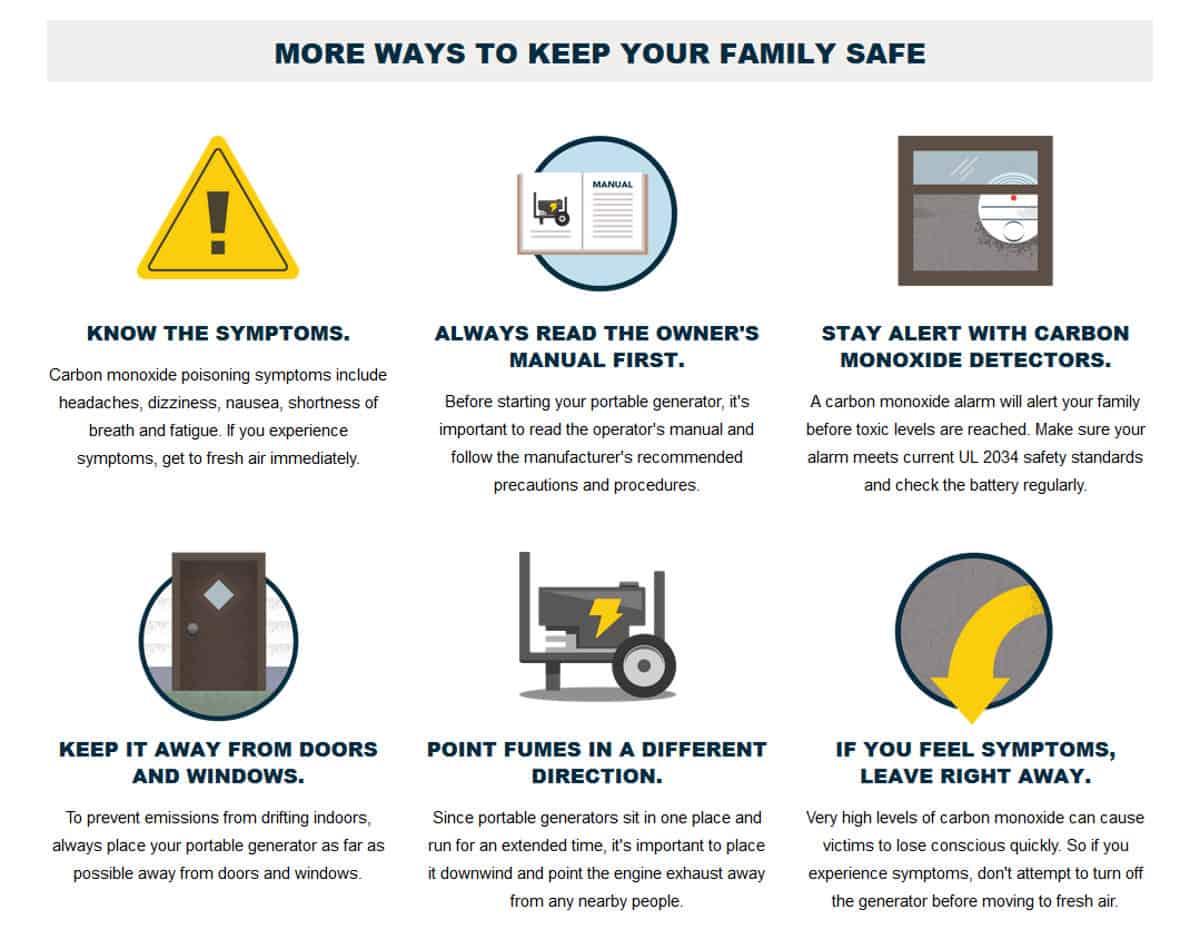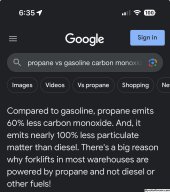You are using an out of date browser. It may not display this or other websites correctly.
You should upgrade or use an alternative browser.
You should upgrade or use an alternative browser.
Generator in the garage - Thoughts?
- Thread starter Watts Happening
- Start date
curiouscarbon
Science Penguin
- Joined
- Jun 29, 2020
- Messages
- 3,024
thanks for mentioning airflow resistance adding up and causing various dangerous failure modes.Beware of exhaust back-pressure. Those little generators tend to have issues with extending exhaust line; it may not show up at first, but over time they get gummed up and fail.
perhaps placing it outside with some sort of disconnect so only the generator is at risk during exceptional weather events. how much is the generator cost?
Not from this scenario. We're talking about actually piping the exhaust outside, not just dropping a generator near an open window and calling it good.If the garage is attached to the house I just would not do it at all. So many people here in Florida die from this scenario every hurricane.
Watts Happening
I call it like I see it.
- Joined
- May 3, 2022
- Messages
- 802
I don’t disagree, I will however note when I read these stories they tend to be “relatively obvious” failures to provide any level of safety.If the garage is attached to the house I just would not do it at all. So many people here in Florida die from this scenario every hurricane.
Stuff like this (two men dead in two separate bedrooms, generator in the hallway..) https://abc7news.com/amp/sea-ranch-...y-sheriff-carbon-monoxide-poisoning/12694744/
To touch on some other points from other comments:
This is a cheap generator I already have, about $400. I don’t expect to ever “need” to do this, I’m simply planning ahead.
I agree with back pressure, however I should mention (if I already haven’t) this generator would be running on propane and my transition to another exhaust system would be upsized. Outlet is .75”, I’d transition to a minimum of 1”, possibly 1.5”. Length of exhaust run wouldn’t be more than maybe 10 feet.
For those that have asked about some relatively obvious things like opening the garage; the entire point here is to maintain every bit of “stealth” as possible. I only foresee this during an extended power outage where I’m not wanting to broadcast that I’m the only house in a densely populated residential street that is enjoying the comforts of power. Keeping it in the garage and the muffler are all an attempt to not alert anyone to me running a generator. Any other scenario I will happily run my generator outside.
Again, this would only be done when we’re awake, with redundant CO sensors, with multiple doors, ventilation etc.
Watts Happening
I call it like I see it.
- Joined
- May 3, 2022
- Messages
- 802
Most internal combustion engines are designed under assumption of back pressure on exhaust in the range of normal atmospheric pressure.I've seen people weld a threaded pipe fitting to the exhaust port.
Extending exhaust pipe can result in a higher concentration of co in the exhaust, overheating, engine shut down or failure.
Hedges
I See Electromagnetic Fields!
- Joined
- Mar 28, 2020
- Messages
- 20,689
Why not crack your garage door for supply air?
Even with the door wide open, it is possible for the CO to back up into the home. Without so much as 5 sides around a generator, just being outside near a window, this has happened.

Portable Generator Placement for Safety | Norwall
Avoid Carbon Monoxide Poisoning. CO is Deadly Dangerous. An odorless and colorless byproduct of internal combustion engines and carbon based fuels.
 blog.norwall.com
blog.norwall.com
"In Newark, New Jersey, two nineteen-year-old girls were killed by carbon monoxide from a generator placed outside their apartment window."
Although I don't know for certain, I attribute a splitting headache to sleeping in my car (ski area parking lot) adjacent to a motor home with generator running.
Unlike cars with O2 sensor and closed-loop fuel injection plus catalytic converter, portable generators emit high levels of CO.
Also, even though you might duct exhaust outside, there is blowby past the rings. Old engines just let that vent through crankcase breather but newer models do such that into engine. Still, you don't want any fumes from around the engine getting into house. I think engine needs to be kept in a negative pressure enclosure with air exhausted where it will leave the area.
Watts Happening
I call it like I see it.
- Joined
- May 3, 2022
- Messages
- 802
In both instances you’re explaining a scenario with obvious ventilation INTO the occupied space.Even with the door wide open, it is possible for the CO to back up into the home. Without so much as 5 sides around a generator, just being outside near a window, this has happened.

Portable Generator Placement for Safety | Norwall
Avoid Carbon Monoxide Poisoning. CO is Deadly Dangerous. An odorless and colorless byproduct of internal combustion engines and carbon based fuels.blog.norwall.com
"In Newark, New Jersey, two nineteen-year-old girls were killed by carbon monoxide from a generator placed outside their apartment window."
Although I don't know for certain, I attribute a splitting headache to sleeping in my car (ski area parking lot) adjacent to a motor home with generator running.
Unlike cars with O2 sensor and closed-loop fuel injection plus catalytic converter, portable generators emit high levels of CO.
Also, even though you might duct exhaust outside, there is blowby past the rings. Old engines just let that vent through crankcase breather but newer models do such that into engine. Still, you don't want any fumes from around the engine getting into house. I think engine needs to be kept in a negative pressure enclosure with air exhausted where it will leave the area.
I’m CLEARLY not going to place it outside an open window. Hell, it’s winter in this example, no windows will be open. Nothing from outside will be venting to inside.
Your RV scenario seems the exact same to me, powered ventilation into your vehicle from exhaust gasses outside.
Sure, old engines can have blow by. This is a brand new generator, that does indeed have crankcase ventilation back into the motor. It will be running on propane which as previously stated emits 60% less carbon monoxide, it will be exhausted outside completely. It will have an air intake (even if it didn’t this would actually HELP keep carbon monoxide from the house as it would create negative pressure. Which could be argued as eating up oxygen from inside).
We’ll also NOT be committing the same mistake as the two above scenarios and sleeping while running this setup.
I’d also bet neither of those scenarios had any form of CO alarm.
All in all, those don’t seem to be apples to apples. Completely different fuel sources, while sleeping, without any protective measures (detectors), direct ventilation into the occupied space etc.
Wiring a CO detector to a relay to auto shutoff the generator could be done for the price of an interconnectable co detector a relay small battery and could be a life saver no mater where the generator is located.
If the goal of the project is to reduce noise and prevent theft I think there are other ways to accomplish the same goals with less risks and have other benefits like using the exhaust to heat water for bathing / space heating as an example.
How much fuel does the generator use per hr? How much fuel do you have on hand? An extended outage may not look like we expect it would. Puerto Rico was without power for months, if anyone here lived through that and has some lessons learned I'd like to hear them in case such a thing happens in my neck of the woods.
If the goal of the project is to reduce noise and prevent theft I think there are other ways to accomplish the same goals with less risks and have other benefits like using the exhaust to heat water for bathing / space heating as an example.
How much fuel does the generator use per hr? How much fuel do you have on hand? An extended outage may not look like we expect it would. Puerto Rico was without power for months, if anyone here lived through that and has some lessons learned I'd like to hear them in case such a thing happens in my neck of the woods.
Hedges
I See Electromagnetic Fields!
- Joined
- Mar 28, 2020
- Messages
- 20,689
Your RV scenario seems the exact same to me, powered ventilation into your vehicle from exhaust gasses outside.
No powered ventilation. Just sleeping in my car, and ambient exhaust from neighboring parking spot.
Don't know for sure it was CO.
I’d also bet neither of those scenarios had any form of CO alarm.
No, they didn't.
First step would be to close your garage door and release a smelly gas into the garage. Test with your nose to see if you detect it in house.
Can you situate the generator somewhere outside with no possibility of gas intrusion and bury a wire (not conduit)?

Watts Happening
I call it like I see it.
- Joined
- May 3, 2022
- Messages
- 802
I’m not against wiring something like that in, I just REALLY don’t expect to need to do any of this. We’re not in a hurricane area, generally speaking our biggest threat is winter storms and even then, our utilities are underground and we have an exceptionally reliable power grid. I’ve lived here my entire life and it’s never been an issue.Wiring a CO detector to a relay to auto shutoff the generator could be done for the price of an interconnectable co detector a relay small battery and could be a life saver no mater where the generator is located.
If the goal of the project is to reduce noise and prevent theft I think there are other ways to accomplish the same goals with less risks and have other benefits like using the exhaust to heat water for bathing / space heating as an example.
How much fuel does the generator use per hr? How much fuel do you have on hand? An extended outage may not look like we expect it would. Puerto Rico was without power for months, if anyone here lived through that and has some lessons learned I'd like to hear them in case such a thing happens in my neck of the woods.
I can’t think of a power outage of more than 2 hours in the last 10 years. The only 1-2 hour outage was from a car crash a few miles away.
That said, I tend to over prepare. Again we are pretty solid on solar, with a decent battery backup.
The generator in question is this: https://www.championpowerequipment.com/product/200962-2500-watt-dual-fuel-inverter/
It claims up to 34 hours of run time on a 20 pound BBQ tank. Rough math that equates to 14kWh per tank.
I’ve got probably 10x that on hand.
Watts Happening
I call it like I see it.
- Joined
- May 3, 2022
- Messages
- 802
I’ve done a really crappy version of this test and painted/stained things in the garage with no ventilation, other than me walking in and out through the man door and boy, my wife will let you know it stinks lol.No powered ventilation. Just sleeping in my car, and ambient exhaust from neighboring parking spot.
Don't know for sure it was CO.
No, they didn't.
First step would be to close your garage door and release a smelly gas into the garage. Test with your nose to see if you detect it in house.
Can you situate the generator somewhere outside with no possibility of gas intrusion and bury a wire (not conduit)?
View attachment 170691
Cars have engines , and you're sat in a metal box with it .RVs have generators in a compartment. Is it 100% sealed from living space?
Hedges
I See Electromagnetic Fields!
- Joined
- Mar 28, 2020
- Messages
- 20,689
Engineered controls (ventilation, CO alarm) are preferred over Administrative controls (try not to fall asleep).
But elimination of the hazard is preferred.

 en.wikipedia.org
en.wikipedia.org

But elimination of the hazard is preferred.

Hierarchy of hazard controls - Wikipedia

Hedges
I See Electromagnetic Fields!
- Joined
- Mar 28, 2020
- Messages
- 20,689
Cars have engines , and you're sat in a metal box with it .
Firewall may or may not be well sealed. Exhaust gas can back up inside.
Tends to be a problem with leaky exhaust system under car, also poorly running engine and older models designed to run rich.
People die from carbon monoxide in cars, especially if they sleep with engine running. Not sleeping it could happen too, but you should notice stinky exhaust and usually you're driving.
Relatively small but not entirely insignificant number of deaths simply due to operating vehicle outdoors. e.g. 1.5 per year in New Mexico.
"During 1980 1995, a total of 56 motor-vehicle related CO poisoning deaths occurred in New Mexico: 24 (43%) were caused by the combination of a faulty exhaust system and an inadequately ventilated passenger compartment; 22 (39%), by operation of a motor vehicle inside an improperly ventilated structure; and 10 (18%), by the use of a fuel-burning heating device inside an inadequately ventilated passenger compartment. During this period, the number of deaths increased sharply during October and peaked during December January"
Watts Happening
I call it like I see it.
- Joined
- May 3, 2022
- Messages
- 802
This settles it, I’m going to make a video of it for YouTube.
You just wait, this will have all the incredible cinematic features of a high budget Hollywood Blockbuster film.
“Here I am in my garage trying to see if I can survive the 79cc propane apocalypse”
You just wait, this will have all the incredible cinematic features of a high budget Hollywood Blockbuster film.
“Here I am in my garage trying to see if I can survive the 79cc propane apocalypse”
Firewall may or may not be well sealed.
Some more sealed than others ?
Quattrohead
Solar Wizard
Police Ford Explorers were gassing the officers to sleep whilst sat idle with the engine running. they had to modify the tail pipes. Or was it a doughnut sugar coma ?
Anyway, you seem determined to do it, just don't knock yourself out.
Anyway, you seem determined to do it, just don't knock yourself out.
Tulex
Solar Wizard
Really boils down to how good you feel about it. As mentioned, RVs have them. Ours was right under the bed. But there was also a sticker on the wall that said not to sleep with it running. Can it be done safely? Probably. Can something, anything fail? Yes.
Some people on here are surprised that some of us put our batteries in our houses, some of us think nothing of it.
Some people on here are surprised that some of us put our batteries in our houses, some of us think nothing of it.
Watts Happening
I call it like I see it.
- Joined
- May 3, 2022
- Messages
- 802
I totally get where you're coming from. I hope to never need to do it. But, I think it's worth testing to see what the real world numbers look like.Police Ford Explorers were gassing the officers to sleep whilst sat idle with the engine running. they had to modify the tail pipes. Or was it a doughnut sugar coma ?
Anyway, you seem determined to do it, just don't knock yourself out.
Some points, not to be taken as arguments, just considerations:
Ford Explorer is likely a 5,000cc engine, burning gasoline, with powered ventilation blowing air into the vehicle from outside.
Zero detectors, long periods of sitting in that scenario in a small box of nasty air. Certainly seems like a recipe for disaster to me.
I'm looking at maybe, once in a blue moon, considering running a 79cc propane powered generator just above idle in a large room, with all exhaust being sent outside away from any inlet to the home will using redundant detectors and ensuring I'm awake/alert and completely aware of the scenario at hand.
Heck, I'd like to think even talking about this idea at all shows how serious I am about mitigating risks.
I have two Wi-Fi connected CO detectors on the way for purposes of the test, along with existing detectors in the home.
Similar threads
- Replies
- 8
- Views
- 422
- Replies
- 5
- Views
- 329
- Replies
- 38
- Views
- 2K



